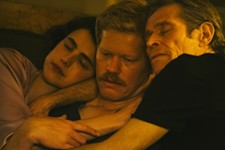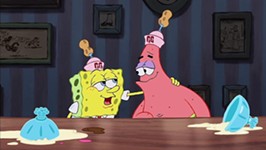Wen Ren’s End-of-the-World Drama Last Sunrise Found Its Spark in China
Light in the dark
By Richard Whittaker, Fri., July 19, 2019
There can be no more definitive end of the world than the sun disappearing from the sky. That's the start of the apocalypse in Last Sunrise, the Chinese-made debut of American filmmaker Wen Ren, which receives its Texas premiere this week as part of the Other Worlds science-fiction film festival's year-round programming. However, this cosmic calamity is simply the background for a more personal story.
Ren had seen disaster close up. As a director, editor, and camera operator on the TV documentary series US Tzu Chi 360, he said, "Whenever a disaster struck, I went to capture the stories." Yet the more he covered these personal tragedies, the more he saw people experience what he called "an ironic cause and effect, where a really bad thing – for them, really, the end of the world – happened to them, and out of that, years later, they happened to grow from this." One particular story, that of two neighbors in New Orleans, stayed with him. Like most neighbors, they never exchanged more than a few words – until Hurricane Katrina hit. "One house was flooded, the other house was fine, and the one neighbor invited the other over. 'Hey, why don't you stay at my place until you're back on your feet?' and they became best friends ever."
That shaped the story of Sun Yang (Zhang Jue) and Chen Mu (Zhang Yue), two neighbors with no connection who are forced together after the sun disappears completely from the heavens. As the Earth cools and the solar system spins apart, they are pulled closer together. Ren said, "It's a road trip movie, but in my head it's more of a road trip movie of the heart, of their internal growth."
With the massive success of blockbuster The Wandering Earth – currently 2019's sixth-biggest film at the global box office – it's been the year for Chinese cinematic science fiction to gain international recognition. As an American making a film in China, Ren saw core differences in storytelling. He said, "The function of Western science fiction is to be pessimistic, to imagine all the bad stuff that's going to happen and how we can avoid it going forward. But Chinese science fiction is very different, because it's tied together with the Chinese Dream, which is very similar to the American Dream – how will the future and how will technology benefit us?"
Ren originally wrote the script in English, to be shot in America. However, the decision to make the film in China, with a Chinese cast and crew, meant pivotal changes in the nature of the story – and not always voluntary ones, due to China's tough film censorship laws. Although Ren was only forced to cut one scene, a violent attack written for the original American draft, he said, "It ended up being a pro for us, because the film became even more focused on the two characters, rather than the outside world."
Yet the real impact of changing the shooting location was that core philosophical difference between American and Chinese sci-fi. For Ren, it is summed up in one phrase: "Yang guang ji ji xiang shang," which translates roughly to "sunny and positive." It allowed for a sense of optimism, even in the worst circumstances, and ultimately evoked the original themes of his script. "There's growth that happens out of this darkness."
Austin Chronicle: Having the sun go out is a unique end to the world, the complete opposite of burning Earth features like No Blade of Grass or The Day the Earth Caught Fire, but with elements of resource shortage films like Mad Max. You avoid talking too much about why it happens, and the characters are less bothered by the cause than just surviving.
Wen Ren: One part of what makes this different to other apocalyptic films is that the focus is completely on the characters. Even the explanation of what happened, I felt that was a little too much. I would have cut that down even more, if I had another pass.
Another thing is that, coming from my experience of shooting the documentaries, you really don't know when something is going to happen. When something happens, and you can't get a line, or you can't find your family, you don't know. So you have a choice: Am I going to try to find a way – find a way to find my parents, find a way to rebuild my house – or do I give up? Everyone has different reactions, and in the movie we try to show all of them, but most people would try to live. They would try to survive.
All the solutions are discovered with the characters. Us, as the audience, we're not given anything, any new piece of information that our two characters do not know. It was a way to feel subjectivity, to put us in the passenger seat.
AC: So why, as an American filmmaker, did you decide to shoot your first feature in China?
WR: In one way, I wanted to rediscover my motherland, and learn my language again, and see my grandparents more, and that was one side of it that's not so related to the film.
The creative reasoning I found is that I loved science fiction. I watched it growing up in America – it's part of everyone's staple diet – but in recent years I've discovered that a lot of American science fiction movies that they tend to be blockbusters. They're doing more, but saying less.
What gave me the confidence to try to do it was that I've been making these shorts. Since I came to Hollywood, every year I'd make one short, no matter what. One year, I finally decided to try science fiction. We had a thousand dollars, and we made this short sci-fi called "Cafe Glass" which premiered at Tribeca Film Festival. That was shocking to me, because it was interesting how I could take some of the social messages and what I wanted to say, and recontextualize it in this genre.
That was the first time that I had the confidence to make science fiction, and I wanted to jump straight into a feature, and it came to the question of, OK, if I'm going to make a science fiction feature film, how am I going to make it mine? There have been so many science fiction features made, everything that needs to be said has been said, so how do I find my identity – and that was the key word. Was it my film style, my niche, and my personal journey of trying to reconnect with my motherland? So it was these two reasons, and I just quit my job and flew over there.
There was another reason. Seeing a lot of Hollywood films, you look at some of the classic like Blade Runner and even more recent films like Her, they somehow find a way to make films about the future and completely exclude Asian elements, except for production design. For me, that was insane. How can you imagine a future without the influence of Asians? Obviously, I probably wouldn't be able to make it in Hollywood – this was before Crazy Rich Asians – and I just felt like science fiction in terms of genre would be a perfect midpoint between East and West. The point of science fiction is to talk about these alien worlds, and talk about extrapolating were we're going. ... And China, as a society, is very utopian/dystopian, depending how you look at it.
So it was all these perfect pieces that came together as, you know what? If I'm going to make a science fiction movie, it's going to be in China.
Other Worlds presents Last Sunrise Wed., July 24, 7:30pm @Galaxy Highland 10, 6700 Middle Fiskville. Director Wen Ren in attendance. Tickets and info at www.otherworldsfilmfest.com.











